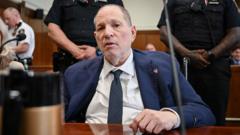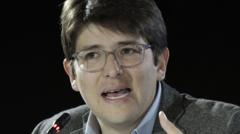A plea of not guilty has been entered by Mangione as both state and federal cases progress simultaneously against him.
**US Government Seeks Death Penalty for Alleged Assassin of Healthcare CEO**

**US Government Seeks Death Penalty for Alleged Assassin of Healthcare CEO**
US prosecutors aim for capital punishment against Luigi Mangione for the murder of UnitedHealthcare’s Brian Thompson, sparking a fierce legal battle.
In a shocking turn of events, US prosecutors have put forth their intention to seek the death penalty for Luigi Mangione, accused of fatally shooting UnitedHealthcare CEO Brian Thompson in December. Attorney General Pam Bondi made the announcement, describing the murder as a "premeditated, cold-blooded assassination." Thompson was killed outside a hotel in New York City on December 4, prompting a nationwide manhunt that ultimately led to Mangione's arrest days later in Pennsylvania.
The 26-year-old has pleaded not guilty to state charges but has not yet entered a plea regarding separate federal charges. He is currently being held in a New York prison awaiting trial. Bondi categorized Thompson's killing as "an act of political violence," indicating that it posed a severe risk to others in the vicinity. Investigators believe Mangione's anger towards health insurance companies drove him to commit the act.
Mangione's legal representation has criticized the government's decision, labeling it "barbaric" and questioning the ethics of pursuing capital punishment amid a flawed healthcare system. Karen Friedman Agnifilo, his attorney, argued that Mangione is caught in a conflict between state and federal jurisdictions, stating, "While claiming to protect against murder, the federal government moves to commit the pre-meditated, state-sponsored murder of Luigi."
He faces 11 state criminal charges in New York, including first-degree murder and murder as a crime of terrorism. If convicted of all charges, Mangione faces a life sentence without parole. However, the federal charges—related to using a firearm in the commission of murder and interstate stalking resulting in death—render him eligible for the death penalty. Prosecutors have announced that both state and federal cases will progress in parallel.
Evidence presented by New York prosecutors includes a fingerprint match connecting Mangione to the crime scene. It has been revealed that he arrived in New York City on November 24 and stayed in a Manhattan hostel for ten days with a false identity before committing the murder. Thompson was shot in the back by a masked assailant as he approached a hotel where he was about to meet investors.
Mangione was apprehended five days post-attack at a McDonald’s in Pennsylvania, equipped with a ghost gun—an untraceable firearm—along with fake identification and other suspicious materials indicating potential motivation behind his violent act. Thompson’s death has ignited broader discussions about the US healthcare system, reflecting public frustration over perceived injustices within the insurance arena.
Homeland Security Secretary Alejandro Mayorkas expressed concern regarding alarming social media rhetoric following the incident, portraying a landscape of escalating domestic violence tied to growing extremism. The case has unfolded against a backdrop of fierce national debate surrounding healthcare practices, further illuminating the deep-seated anger among the American populace.
As the legal processes unfold, the implications of Mangione's actions and the response from various sectors of society will undoubtedly shape discussions in the coming months around the intricate ties between healthcare policy and public sentiment.
The 26-year-old has pleaded not guilty to state charges but has not yet entered a plea regarding separate federal charges. He is currently being held in a New York prison awaiting trial. Bondi categorized Thompson's killing as "an act of political violence," indicating that it posed a severe risk to others in the vicinity. Investigators believe Mangione's anger towards health insurance companies drove him to commit the act.
Mangione's legal representation has criticized the government's decision, labeling it "barbaric" and questioning the ethics of pursuing capital punishment amid a flawed healthcare system. Karen Friedman Agnifilo, his attorney, argued that Mangione is caught in a conflict between state and federal jurisdictions, stating, "While claiming to protect against murder, the federal government moves to commit the pre-meditated, state-sponsored murder of Luigi."
He faces 11 state criminal charges in New York, including first-degree murder and murder as a crime of terrorism. If convicted of all charges, Mangione faces a life sentence without parole. However, the federal charges—related to using a firearm in the commission of murder and interstate stalking resulting in death—render him eligible for the death penalty. Prosecutors have announced that both state and federal cases will progress in parallel.
Evidence presented by New York prosecutors includes a fingerprint match connecting Mangione to the crime scene. It has been revealed that he arrived in New York City on November 24 and stayed in a Manhattan hostel for ten days with a false identity before committing the murder. Thompson was shot in the back by a masked assailant as he approached a hotel where he was about to meet investors.
Mangione was apprehended five days post-attack at a McDonald’s in Pennsylvania, equipped with a ghost gun—an untraceable firearm—along with fake identification and other suspicious materials indicating potential motivation behind his violent act. Thompson’s death has ignited broader discussions about the US healthcare system, reflecting public frustration over perceived injustices within the insurance arena.
Homeland Security Secretary Alejandro Mayorkas expressed concern regarding alarming social media rhetoric following the incident, portraying a landscape of escalating domestic violence tied to growing extremism. The case has unfolded against a backdrop of fierce national debate surrounding healthcare practices, further illuminating the deep-seated anger among the American populace.
As the legal processes unfold, the implications of Mangione's actions and the response from various sectors of society will undoubtedly shape discussions in the coming months around the intricate ties between healthcare policy and public sentiment.




















